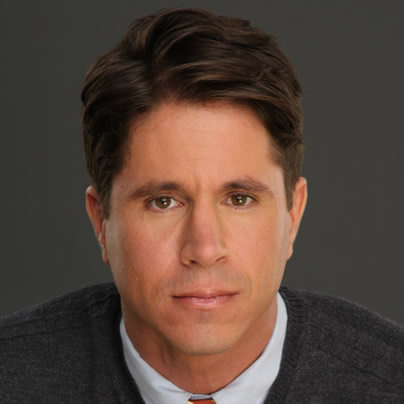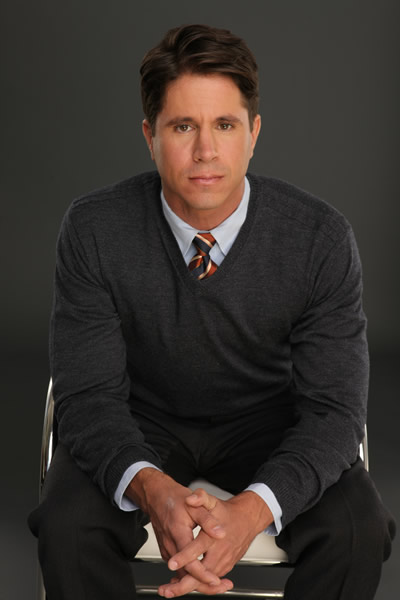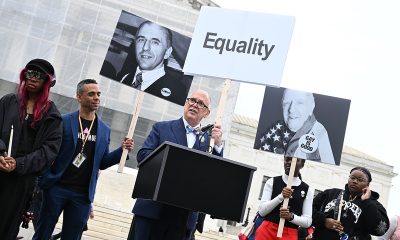National
Meet GLAAD’s new firebrand-in-chief
Plainspoken Graddick working to restore media watchdog after scandal


After a tumultuous 2011, and nearly a year without a permanent leader, GLAAD announced its new president is Herndon Graddick. (Courtesy photo)
The first thing you discover about Herndon Graddick, the new president of the Gay & Lesbian Alliance Against Defamation, is that he’s direct and plainspoken —he doesn’t mince words the way more seasoned LGBT leaders do.
Earlier this week, Graddick told Europe’s Gay Star News, “I think it’s finally time for us to grab our power and really use it and make sure that we’re not sort of treated as second-class citizens anymore. I intend to do that in this role at GLAAD.”
He added that when he finally met other gay people after moving to California at 19, he was “pissed off.”
“Everything I had been taught was essentially bullshit,” he said of his epiphany upon coming out and realizing that LGBT youth were being taught they should remain in the closet.
Graddick worked for Current TV, CNN and at a global climate change initiative before becoming GLAAD’s vice president of programs and communication in 2010.
His determination and spirit match those of grassroots activists on the ground, rather than someone trying to appease finicky donors and politicians. And the honesty is a far cry from the political calculus of former President Jarrett Barrios, who resigned in June 2011 after a scandal regarding his role in pushing the FCC to approve AT&T-backed initiatives.
Graddick sat down with the Blade to discuss his role at GLAAD since that time and his vision for the future.
WASHINGTON BLADE: What was your role at the organization before being picked by the board for this position?
HERNDON GRADDICK: I was the head of programs and communications, so I oversaw all of our activist work, basically everything but the fundraising and sort of the physical operations of the organization, so everything we do in the movement.
BLADE: You’ve got a thorough handle on the inner workings of the organization, especially in terms of the programming?
GRADDICK: Yes I have. One of the reasons why I wanted to do this job is I feel like the work we’ve done in the past year has been really making a difference, and I’ve felt really satisfied by that. So I wanted to put my name in the ring for the president’s spot because I want that to continue and I wanted to do even more of it. And so it’s really a product of my believing in the work that I put myself up for this job. I’m humbled and take with seriousness the duties that the role has.
BLADE: What would you list as GLAAD’s biggest successes in the last year?
GRADDICK: The media awards are, as you know, how we support our work. They’re a fundraiser, they get the most attention in the U.S. and in the world, because celebrities are inevitably what people pay the most attention to. But GLAAD’s work is from the grassroots to the local, state and national levels. Some of that work gets a lot of attention in the press, and some of it doesn’t. But nonetheless all of it is important.
I would say that our Commentator Accountability Project that we just launched is something that’s really important to me, and works toward what I wanted to do when I came to GLAAD. To hold anti-gay activists accountable to the full breadth of their animus toward the gay community, and give journalists an easy access resource of what these anti-gay people have actually said.
And recently, Miss Universe has agreed to change their rules to allow the inclusion of transgender women, and we’re waiting to see the details of that, but we’ve gotten the full-throated promise from them that those details were coming, and I think that the fact that transgender women are now going to be participating alongside everybody else in the Miss Universe pageant, is a sign of the times that the world is changing to view LGBT people just like anybody else.
I could really go on and on about different things that I’ve been proud of, but I think in general our mission is creating a media where LGBT people can thrive, and where LGBT youth don’t have their self-esteem dictated by negative portrayals in the media and we’re able to be happy and live our lives just like anybody else.
BLADE: GLAAD’s had some great highs in the past year, but also some lows. How do you plan to continue to repair GLAAD’s public image in the LGBT community?
GRADDICK: Well, I’ve been really flattered and humbled by the press that we’ve received around our recent changes, and when I read that press, what I really think is what people are speaking to now is the strength of our programmatic work in the last nine months, and I think that people are really noticing that the work that we’re doing is having an impact. So I’m really encouraged by that, and I take inspiration in that. And my personal view is that we’re all in this together, and so I’m really grateful for the work that activists and bloggers and other movement organizations — it feels like we’re working together better than I’ve seen in the past, and I’m really encouraged by that.
I really look forward to working with the movement and the blogosphere and the LGBT press. Let’s keep our eye on the ball, and let’s fight for LGBT equality, and keep our sense of who the enemy is, and that’s people who would deprive us of all the rights and privileges that are afforded to every other American. I really take great pride in the fact that I’m in this position of helping to do so. I thank everybody out there for their individual efforts, and GLAAD is always open to hear the support, the advice and the criticism telling us where we can do things better and differently. I welcome that.
BLADE: What is your vision for GLAAD going forward?
GRADDICK: I think that over the years GLAAD has been a really effective force for the inclusion of fair and accurate portrayals of LGBT people in media, and my intention is to continue to be that. I think we’ve both been a defensive force against defamation, I think the time is now not just to be defensive, but to really go on the offensive, because we’re sick of not being treated like everybody else, and Americans are behind us and I think that if you really put your finger in the air, you can feel something changing in America. And so it’s my chance to be the tip of the spear — along with other movement organizations and bloggers and activists — to really make sure that this isn’t about asking for us to be treated fairly, it’s about demanding and insuring that we are treated fairly. So my interest in being the head of GLAAD is making sure that happens.
U.S. Supreme Court
Supreme Court to consider bans on trans athletes in school sports
27 states have passed laws limiting participation in athletics programs

The U.S. Supreme Court on Thursday agreed to hear two cases involving transgender youth challenging bans prohibiting them from participating in school sports.
In Little v. Hecox, plaintiffs represented by the ACLU, Legal Voice, and the law firm Cooley are challenging Idaho’s 2020 ban, which requires sex testing to adjudicate questions of an athlete’s eligibility.
The 9th U.S. Circuit Court of Appeals described the process in a 2023 decision halting the policy’s enforcement pending an outcome in the litigation. The “sex dispute verification process, whereby any individual can ‘dispute’ the sex of any female student athlete in the state of Idaho,” the court wrote, would “require her to undergo intrusive medical procedures to verify her sex, including gynecological exams.”
In West Virginia v. B.P.J., Lambda Legal, the ACLU, the ACLU of West Virginia, and Cooley are representing a trans middle school student challenging the Mountain State’s 2021 ban on trans athletes.
The plaintiff was participating in cross country when the law was passed, taking puberty blockers that would have significantly reduced the chances that she could have a physiological advantage over cisgender peers.
“Like any other educational program, school athletic programs should be accessible for everyone regardless of their sex or transgender status,” said Joshua Block, senior counsel for the ACLU’s LGBTQ and HIV Project. “Trans kids play sports for the same reasons their peers do — to learn perseverance, dedication, teamwork, and to simply have fun with their friends,” Block said.
He added, “Categorically excluding kids from school sports just because they are transgender will only make our schools less safe and more hurtful places for all youth. We believe the lower courts were right to block these discriminatory laws, and we will continue to defend the freedom of all kids to play.”
“Our client just wants to play sports with her friends and peers,” said Lambda Legal Senior Counsel Tara Borelli. “Everyone understands the value of participating in team athletics, for fitness, leadership, socialization, and myriad other benefits.”
Borelli continued, “The U.S. Court of Appeals for the Fourth Circuit last April issued a thoughtful and thorough ruling allowing B.P.J. to continue participating in track events. That well-reasoned decision should stand the test of time, and we stand ready to defend it.”
Shortly after taking control of both legislative chambers, Republican members of Congress tried — unsuccessfully — to pass a national ban like those now enforced in 27 states since 2020.
Federal Government
UPenn erases Lia Thomas’s records as part of settlement with White House
University agreed to ban trans women from women’s sports teams

In a settlement with the Trump-Vance administration announced on Tuesday, the University of Pennsylvania will ban transgender athletes from competing and erase swimming records set by transgender former student Lia Thomas.
The U.S. Department of Education’s Office for Civil Rights found the university in violation of Title IX, the federal rights law barring sex based discrimination in educational institutions, by “permitting males to compete in women’s intercollegiate athletics and to occupy women-only intimate facilities.”
The statement issued by University of Pennsylvania President J. Larry Jameson highlighted how the law’s interpretation was changed substantially under President Donald Trump’s second term.
“The Department of Education OCR investigated the participation of one transgender athlete on the women’s swimming team three years ago, during the 2021-2022 swim season,” he wrote. “At that time, Penn was in compliance with NCAA eligibility rules and Title IX as then interpreted.”
Jameson continued, “Penn has always followed — and continues to follow — Title IX and the applicable policy of the NCAA regarding transgender athletes. NCAA eligibility rules changed in February 2025 with Executive Orders 14168 and 14201 and Penn will continue to adhere to these new rules.”
Writing that “we acknowledge that some student-athletes were disadvantaged by these rules” in place while Thomas was allowed to compete, the university president added, “We recognize this and will apologize to those who experienced a competitive disadvantage or experienced anxiety because of the policies in effect at the time.”
“Today’s resolution agreement with UPenn is yet another example of the Trump effect in action,” Education Secretary Linda McMahon said in a statement. “Thanks to the leadership of President Trump, UPenn has agreed both to apologize for its past Title IX violations and to ensure that women’s sports are protected at the university for future generations of female athletes.”
Under former President Joe Biden, the department’s Office of Civil Rights sought to protect against anti-LGBTQ discrimination in education, bringing investigations and enforcement actions in cases where school officials might, for example, require trans students to use restrooms and facilities consistent with their birth sex or fail to respond to peer harassment over their gender identity.
Much of the legal reasoning behind the Biden-Harris administration’s positions extended from the 2020 U.S. Supreme Court case Bostock v. Clayton County, which found that sex-based discrimination includes that which is based on sexual orientation or gender identity under Title VII rules covering employment practices.
The Trump-Vance administration last week put the state of California on notice that its trans athlete policies were, or once were, in violation of Title IX, which comes amid the ongoing battle with Maine over the same issue.
New York
Two teens shot steps from Stonewall Inn after NYC Pride parade
One of the victims remains in critical condition

On Sunday night, following the annual NYC Pride March, two girls were shot in Sheridan Square, feet away from the historic Stonewall Inn.
According to an NYPD report, the two girls, aged 16 and 17, were shot around 10:15 p.m. as Pride festivities began to wind down. The 16-year-old was struck in the head and, according to police sources, is said to be in critical condition, while the 17-year-old was said to be in stable condition.
The Washington Blade confirmed with the NYPD the details from the police reports and learned no arrests had been made as of noon Monday.
The shooting took place in the Greenwich Village neighborhood of Manhattan, mere feet away from the most famous gay bar in the city — if not the world — the Stonewall Inn. Earlier that day, hundreds of thousands of people marched down Christopher Street to celebrate 55 years of LGBTQ people standing up for their rights.
In June 1969, after police raided the Stonewall Inn, members of the LGBTQ community pushed back, sparking what became known as the Stonewall riots. Over the course of two days, LGBTQ New Yorkers protested the discriminatory policing of queer spaces across the city and mobilized to speak out — and throw bottles if need be — at officers attempting to suppress their existence.
The following year, LGBTQ people returned to the Stonewall Inn and marched through the same streets where queer New Yorkers had been arrested, marking the first “Gay Pride March” in history and declaring that LGBTQ people were not going anywhere.
New York State Assemblywoman Deborah Glick, whose district includes Greenwich Village, took to social media to comment on the shooting.
“After decades of peaceful Pride celebrations — this year gun fire and two people shot near the Stonewall Inn is a reminder that gun violence is everywhere,” the lesbian lawmaker said on X. “Guns are a problem despite the NRA BS.”
-

 U.S. Supreme Court1 day ago
U.S. Supreme Court1 day agoSupreme Court to consider bans on trans athletes in school sports
-

 Out & About1 day ago
Out & About1 day agoCelebrate the Fourth of July the gay way!
-

 Maryland4 days ago
Maryland4 days agoSilver Spring holds annual Pride In The Plaza
-

 Opinions4 days ago
Opinions4 days agoSupreme Court decision on opt outs for LGBTQ books in classrooms will likely accelerate censorship









